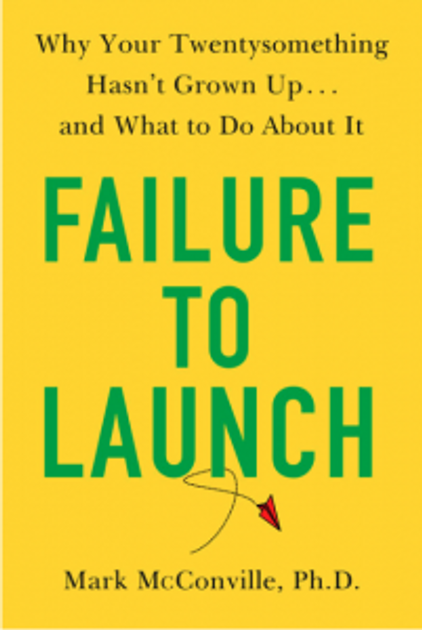If Your Child's Failure to Launch Becomes a Money Problem for You
A psychologist specializing in emerging adults offers advice for parents
In his new book, Failure To Launch: Why Your Twentysomething Hasn’t Grown Up…and What to Do About It, clinical psychologist Mark McConville writes mostly about problems some young adults have, well, becoming adults. But I was expecially interested in his money chapter: “Breaking the Enabling Trap: Supporting (Not Coddling) Your Struggling Transitioner.”

After all, as a recent AARP study found, half of midlife adults with children age 25 or older have provided financial support to them in the past year. And 51% of the parents providing the support say it’s a financial strain on them.
So I rang up McConville, who is based in Cleveland, to hear his advice for parents with sons and daughters in their 20s dealing with a “failure to launch” — the young adults he calls “transitioners.”
Highlights from our conversation:
Next Avenue: Why did you decide to write this book about “failure to launch” now?
Mark McConville: It wasn’t an issue thirty or forty years ago. It’s an issue that’s accelerating. I’m hearing from people all over the country more and more. Kids are more anxious and not as sure of themselves. On college campuses, mental health services are flooded. When I was in college, nobody knew where the mental health services were.
"The kids I’m talking about, we psychologists joke, are twenty-two going on sixteen."
And what about the money side of failure to launch?
Kids today necessarily remain dependent on their parents longer. It takes longer to be self-reliant.
I think what’s really different from when my kids grew up, and certainly when I did, is that we’re more invested in our children than we used to be. The flipside is we also find that kids become overly dependent on adult support.
What exactly do you mean by “failure to launch?” Is it just about having trouble finding work?
Launching means making the transition out of adult supervision into a world — from high school into college or into the workforce — with no adults nipping at your heels. By twenty-five, you’re expected to be making reasonably adult decisions. The kids I’m talking about, we psychologists joke, are twenty-two going on sixteen. Sometimes, their behavior patterns and thought patterns are more typical of teenagers.

And what is the effect on their parents?
They feel helpless and frustrated. How do you influence a twenty-two-year-old who is acting like a sixteen-year-old? If he’s sixteen, you can ground him and take the car keys. You have tools in your toolbox. But when your kid is in his twenties, what are you going to do? Throw him out? That seems extreme.
It’s about parents trying to make the relationship more adult and setting up a new set of ground rules: If you treat your child more like an adult, there’s a reasonable likelihood your child will step up to the plate.
You write about what you call “the enabling trap.” What’s that?
I’ll tell you a story. One time, I saw a woman in my office. Her son was about twenty. I didn’t hear from her for six months or a year until I got a panicky email one Saturday morning. She told me her son had a terrible driving record and had gotten three speeding tickets which he completely ignored. He got a summons to appear in court and he was refusing to get out of bed to go and was cursing a blue streak. The mom said: ‘What should I do?’ I said: ‘Don’t do anything.’ She said: ‘But if I do that, they’ll take away his license and he won’t be able to get to work or continue taking college classes. I can’t let that happen.’
I should have said: ‘They’ll give him driving privileges to get to school.’ But she went to the court for him with a cockamamie story about him having the flu, and she got him off the hook. That’s how parents get caught in the enabling trap. You begin catastrophizing, thinking of the worst possible outcome and then your instinct to rescue kicks in.
In your book, you have a rule: If your transitioner is facing up to the challenges of becoming an adult, then the help you provide usually qualifies as support. Can you explain this?
I’m asking parents to look at the big picture. If you can see your kids are moving forward, you can make financial decisions about them based on what you can afford.
But on the other hand, you say that if your attempts to be helpful make it easier for your child to avoid the challenges, you’re probably enabling.
Going back to that story of the son and the mother, at some intuitive level, he knew there was a big old safety net if he fell off the high wire. He wasn’t going to die. So, with his decision to sleep in, he had faith it would all work out. And of course, he was right. She was enabling his behavior.
Is letting your child move back into your home and providing free room and board a good idea or a bad idea?
In and of itself, it’s neither a good nor a bad idea. If he is moving forward and has a college degree and is engaged in a job search, absolutely I will support that. If you have extra room in your house and money in your checking account, by all means, why not?
You say that struggling transitioners sometimes take their parents’ material and financial support for granted. Why is that?
Because it’s always been there.
I tell a story in the book about a young person who was a passable student in college, but every once in a while, put three thousand dollars or four thousand dollars on his parent’s credit card. He was so embarrassed. But he told me that growing up, when he would go to a restaurant with his upper-middle-class parents and the bill came, which was often a hundred dollars or more, he couldn’t figure out if that was a lot of money or not. For him, a hundred dollars was an abstraction.
"Many kids are strikingly naïve about the cost of things — even smart kids."
And when he was a child, his parents joked, ‘I have to go to the money tree.’ That image was captivating for him. He told me ‘I know it’s ridiculous. There’s no such thing. But that idea is floating in the back of my mind.’
So, are young adults naïve? Or is it that they don’t want to become fully aware of their financial situation?
Many kids are strikingly naïve about the cost of things — even smart kids.
Is it the parents’ responsibility to teach them about money?
Absolutely! But ninety-five percent of my clients haven’t done it. We create a world for our kids with embedded expectations and then are surprised they’re not grateful. We don’t realize we invented the world where things are just available, and we did it with the best of intentions.

You write about what you call ‘a new paradigm for material support’ for an emerging adult compared to when a child is an adolescent. What do you mean?
I try to get parents to change the ground rules of the relationship, and money is just a vehicle for doing it. I want it to resemble an adult-to-adult relationship.
In high school, the image of material support is that a parent is like an ATM. What I want when the child is older, is that the relationship is more like a small business owner with a banker.
If I’m a small business owner, I don’t say ‘Give me money.’ I say: ‘I have a plan.’ And then the banker decides whether it looks like a good investment. It’s a relationship between adults and both have respect for each other.
If you have a twentysomething asking for material support, it’s beneficial if you think like a banker and say: ‘Where would that thousand-dollar check I write be going?’
How can parents communicate effectively with their twentysomethings about money matters?
I’m a psychologist, not a money manager. And I’ve never been a great manager of my money. But I think practical conversations about money are useful to kids.
And if my daughter was going to open a checking account, I would schedule a meeting with a banker and take her in. I’d ask a lot of intentionally dumb questions, like: ‘What happens if she overdraws? Is there a penalty?’ If she learns from the banker, she will absorb it more than just dad giving another lecture.
I like the idea of getting someone else to say the words.
You have a grown son and a grown daughter. Did they have a failure to launch?
Neither of my children presented challenges, and neither got into serious trouble. Both went to great schools and got advanced degrees. I feel very blessed.


